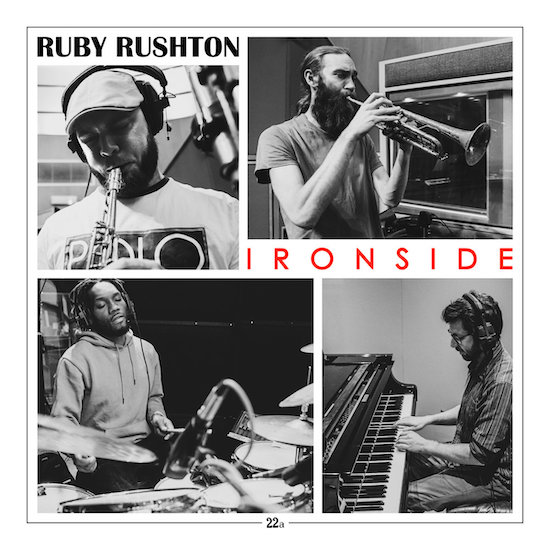Ruby Rushton is the latest project from 22a main man, owner of best stage name in London, and UK jazz pioneer, Tenderlonious. Completed by Nick Waters, Aidan Shepherd and Tim Carnegie, Ruby Rushton specialise in a form of London jazz that’s closer to the traditions of America in the 50s and 60s but with subtle accents that make it feel fresh and contemporary. Ironside is their debut and as strong an introduction as any in London jazz so far.
Opening track ‘One Mo’ Dram’ is cool, late night jazz that bustles with the energy of the kind of bar that only exists in fantasies of 50s New York. The horns are smooth, the percussion is lively, and the keys float along, emphasising the subtle grooves, flourishes and moments of brilliance that would otherwise go unnoticed.
Things turn a corner into ‘Where Are You Now?’ which starts militaristic with an undercurrent of mystery worthy of the track’s questioning title. Hints of film noir soundtracks mingle with the influence of Miles Davis as Nick Walter’s trumpet carries the melody, bringing the whole thing to a blistering finish before ‘The Target’ takes off at full pace.
Unlike some of their peers, most notably Kamaal Williams/ Henry Wu, Tenderlonious’ former signee and long-time collaborator, there’s a less obvious contemporary influence on Ruby Rushton’s sound. Tracks like ‘Return of the Hero’ and closer ‘Pingwin (Requiem for Komeda)’ are almost ten minutes long and would slip seamlessly into a playlist of OG era bebop. However, Ironside is an album that’s keenly aware of its surroundings, and when more current, less straightforwardly jazz influences do creep in, they have a stunning impact.
The most obvious example is ‘Prayer for Grenfell’. Suitably raw and haunting given the tragedy of the event which inspired it, it commands your attention in a way few modern songs do. Tenderlonius’ flute runs unaccompanied for the duration of the track, carving out a skeletal and often audible angry melody that has to be one of the purest musical imaginings of how grief feels in a long time.
On the other end of the spectrum is penultimate track ‘Triceratops/ The Caller’ which plainly put, slaps. Jubilant horns and keys propel the track forwards with flashy drums and all manner of percussion filling in the gaps between refrains. Shifting to a half-time groove midway through its undeniably summery, nodding to reggae as much as to jazz and topped by a scorching synth solo.
Ironside might not be the most boundary-pushing of the new London jazz scene’s offerings, but it remains vibrant, flawlessly executed and totally joyous throughout; it’s hard to ask for more.


